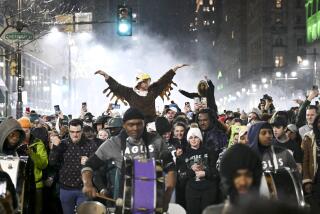Top Workers Are the Best in U.S. at Faking Sick Days
- Share via
The next time you need a break from work, try this on for size:
I have a rare case of 48-hour projectile leprosy. When it’s cleared up, I’ll be in.
That excuse might sound outlandish, but a fake excuse is a fake excuse, and faking it appears to occur more often among better-educated, higher-paid employees than anyone else.
A recent Louis Harris & Associates poll said employees in the United States take an accumulated 200 million sick days a year. Of the employees taking off sick, about 42% earning more than $50,000 a year admit to faking it, said a study by American Demographics magazine.
The employee least likely to fake it makes less than $20,000--perhaps because those workers, who compose 22.7% of the fakers, often don’t have benefits that cover them when they’re out. For them, a sick day is a day of lost pay.
“You’d think that the employees who have a degree, they’re trustworthy, you can depend on them, but not necessarily,” said Gary Blau, a human resources professor at Temple University who studies workplace issues.
Blau says many fake absences are spurred by employee dissatisfaction. He calls that mentality the “equity theory of motivation.”
“If you were my boss and I didn’t get the pay raise or bonus I thought I would get, in order to right that wrong I may decide I’m going to take off a day or two from work,” Blau said. “It makes a lot of sense to employees that they right the wrong that they feel they’ve been dealt by taking a day off. . . . People maintain a psychological balance between what they give and what they get.”
More to Read
Inside the business of entertainment
The Wide Shot brings you news, analysis and insights on everything from streaming wars to production — and what it all means for the future.
You may occasionally receive promotional content from the Los Angeles Times.










